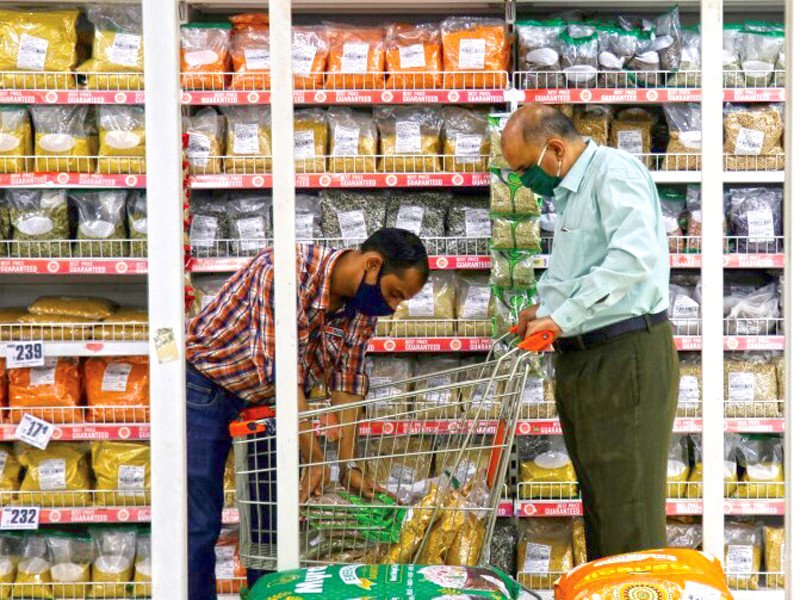The International Monetary Fund (IMF) sees Pakistan’s economy slowing to around 3.5% due to weakening economic conditions and average inflation rate peaking to nearly 20% by the end of the current fiscal year on the back of currency depreciation and higher commodity prices.
The sources in the Ministry of Finance said that during talks for the completion of the 7th review of the bailout package, the global lender significantly revised its projections for the current fiscal year compared with the assessment that it had made at the time of the last review.
The IMF has shaved Pakistan’s previous year economic growth forecast by 1% to 3.5%. But major adjustment is being made in the inflation rate.
The revised projections will be shared with the IMF board that is going to meet on August 29 to consider Pakistan’s request for a $1.2 billion loan tranche and extend the programme till June next year. After the approval of the board, the IMF will release the medium-term macroeconomic framework projections.
In this week’s monetary policy statement, the State Bank of Pakistan had said that the floods caused by unusually heavy and prolonged monsoon rains created downside risks for agricultural production, especially cotton and seasonal crops, and could weigh on growth this year. But it maintained an earlier projection of 3% to 4%.
The government has set the GDP growth target at 5%.
Read Pressure on rupee to ease after IMF deal
“As against the previous forecast of 7.8% inflation rate for this fiscal year, the IMF has now projected average inflation rate at 19.9% for this fiscal year,” according to the sources.
The IMF had held last review talks in 2021 but the report had been finalized in January this year. Within a span of six months, the IMF has drastically revised its inflation forecast.
The surge in global commodity prices, increasing in fuel and electricity prices coupled with exchange rate depreciation is causing higher inflation in Pakistan in years.
The IMF’s assessment is in line with the SBP projection of 18 to 20% inflation rate, which is almost double than the official target of 11.5%.
The headline inflation rose further to 24.9% in July, with the core inflation also shooting up. The central bank said that the necessary reversal of the energy subsidy package, as well as momentum in the prices of essential food items and exchange rate weakness was fueling inflation.
“New assumptions by the IMF suggest that the average exchange rate at the end of this fiscal year will further depreciate compared to the current price of the dollar in the interbank market,” according to the sources.
Although the IMF does not explicitly give exchange rate in its report, its projection for current account deficit and size of the economy give a fair idea of the rate being used to determine these indicators.
The sources said that the IMF sees the current account deficit at $9.3 billion in this fiscal year, which is lower than the previous estimates due to slowing down of the economy. The deficit is equal to 2.5% of the projected size of the economy for this fiscal year and lower than the central bank’s estimates.
However, the IMF has also lowered its gross foreign exchange reserves target for Pakistan by $4.5 billion, which indicates that the government may never be in a comfortable position and would remain busy in stabilising the foreign exchange reserves.
For programme purposes, the IMF monitors progress on the net international reserves level, but this time the IMF asked Pakistan to also make arrangements for increasing the gross reserves by $6.5 billion.
The sources said, “The IMF now sees foreign exchange reserves increasing to $16.2 billion – sufficient for only two months and three weeks of imports.” In January, the IMF had expected Pakistan’s gross foreign exchange reserves increasing to $20.7 billion.
To meet the reserves’ needs, Pakistan has secured an additional $4 billion from friendly countries over and above its external financing needs.
The central bank said this week that the foreign exchange reserves have halved from $16.4 billion in February to $7.9 billion on August 12th, as official inflows have been outpaced by official outflows.
For the current fiscal year, the IMF has assessed Pakistan’s foreign currency requirements at $40 billon, which includes roughly $34 billion for debt repayments and current account deficit financing and another $6.5 billion for reserves building.
This week, Pakistan reviewed the possibility of seeking rescheduling of its external public and publicly guaranteed debt. However, the plan was shelved, for now, due to its adverse implications on the country’s credit rating and limited scope for rescheduling.

